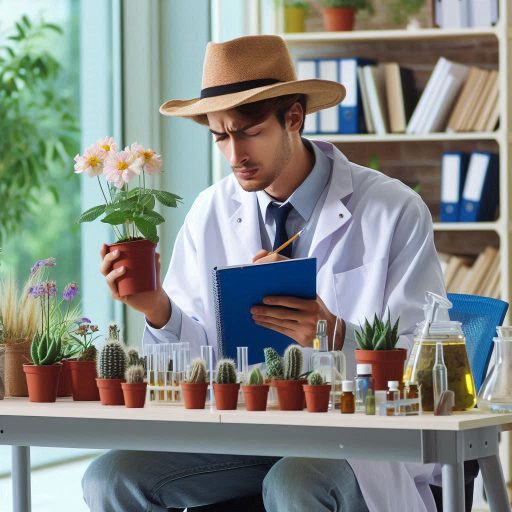Introduction
Plant genetics is a fascinating field that explores the heredity and variation of plants.
It studies the structure and function of genes, as well as the mechanisms of inheritance and genetic diversity.
Understanding plant genetics is essential for researchers and farmers alike, as it plays a critical role in agriculture and the advancement of scientific knowledge.
The importance of plant genetics in agriculture cannot be overstated.
With a rapidly growing global population, the demand for food continues to rise.
Scientists leverage genetic information to develop crop varieties that yield more and resist diseases.
Researchers can identify traits that enhance plants’ resilience to pests and environmental stressors.
They study the genetic makeup of plants.
This understanding helps them target improvements against drought and extreme temperatures.
Plant genetics serves as a cornerstone of modern agriculture and scientific research.
It equips us with the tools needed to address pressing global challenges, such as food security and environmental sustainability.
By delving deeper into this field, we can unlock new possibilities for improving crop production and preserving biodiversity for future generations.
What is Plant Genetics?
Plant genetics is a fascinating branch of science that focuses on the hereditary traits of plants.
It examines how genes influence plant characteristics and how these traits are inherited across generations.
By understanding plant genetics, scientists can improve crops, enhance biodiversity, and explore plant evolution.
Definition of Plant Genetics
Plant genetics is the study of genes and heredity in plants.
It investigates how traits are passed from parent plants to their offspring.
This field integrates molecular biology, biochemistry, and traditional breeding practices.
It plays a crucial role in agriculture, horticulture, and conservation efforts.
Key Concepts in Plant Genetics
- Genes: These are segments of DNA that carry information for specific traits.
Each gene can influence characteristics such as color, size, and disease resistance. - Alleles: These are different forms of a gene.
Alleles can be dominant or recessive, determining how traits manifest in plants. - Genotype: This term describes the genetic makeup of a plant.
It represents the combination of alleles that an organism carries. - Phenotype: This refers to the observable characteristics of a plant.
Phenotypes result from the interaction between genotype and environmental factors. - Chromosomes: These structures house genes.
Plants typically have a specific number of chromosomes that vary by species.
Study of Gene Transmission
Plant genetics focuses on understanding how genes are transmitted from one generation to the next.
The primary mechanisms involved in this process include:
- Mendelian Inheritance: This principle, proposed by Gregor Mendel, explains how traits are passed based on dominant and recessive alleles.
- Meiosis: This is the process of cell division that reduces the chromosome number by half, forming gametes.
During fertilization, these gametes combine, restoring the original chromosome number. - Genetic Recombination: This occurs during meiosis when chromosomes exchange genetic material.
It results in new combinations of alleles, contributing to genetic diversity.
Importance of Plant Genetics
Understanding plant genetics offers numerous benefits:
- Crop Improvement: Genetic knowledge allows scientists to develop crops with desirable traits, such as drought resistance or higher yields.
- Disease Resistance: Identifying genes that confer disease resistance can help create healthier plants.
- Biodiversity Conservation: Plant genetics aids in preserving endangered species by understanding their genetic variability.
- Evolutionary Studies: Studying plant genetics helps scientists comprehend evolutionary processes and relationships among different species.
Plant genetics provides invaluable insights into the hereditary processes of plants.
By studying how genes are passed down, researchers can contribute to advancements in agriculture, conservation, and our overall understanding of plant biology.
History of Plant Genetics
Plant genetics has a rich history, rooted in the groundbreaking work of Gregor Mendel.
His experiments laid the foundation for modern genetics.
Gregor Mendel and His Experiments with Peas
In the 19th century, Mendel, an Austrian monk, began his studies at a monastery.
He chose pea plants due to their distinct traits and ease of cultivation.
Mendel‘s experiments focused on key characteristics, including:
- Flower Color: Purple vs. white
- Seed Shape: Round vs. wrinkled
- Pod Color: Green vs. yellow
- Plant Height: Tall vs. short
Mendel meticulously cross-pollinated plants and tracked the traits of offspring.
He discovered predictable patterns in trait inheritance.
For instance, when he crossed pure purple-flowered peas with pure white-flowered peas, all offspring had purple flowers.
Mendel‘s findings revealed two essential principles of inheritance:
- Law of Segregation: Each organism carries two alleles for each trait, which segregate during gamete formation.
- Law of Independent Assortment: Alleles for different traits segregate independently during gamete formation.
Despite his groundbreaking work, Mendel’s research went largely unnoticed during his lifetime.
It wasn‘t until the early 20th century that scientists recognized its significance.
Development of Modern Plant Genetics Research
The rediscovery of Mendel‘s work in the early 1900s sparked interest in plant genetics.
Researchers began to build on Mendel‘s principles, advancing the field significantly.
Key developments include:
- Chromosomal Theory of Inheritance: Scientists identified chromosomes as carriers of genetic information.
- Discovery of DNA Structure: In 1953, Watson and Crick elucidated the double-helix structure of DNA, revealing its role in heredity.
- Genetic Mapping: Researchers began to map plant genomes, identifying specific genes responsible for traits.
Modern plant genetics now encompasses a variety of techniques.
These include:
- Molecular Markers: Scientists use molecular markers to identify genetic variations among plant populations.
- Genetic Engineering: Techniques like CRISPR allow for targeted modifications in plant DNA, enhancing desirable traits.
- Genomics: Advances in sequencing technology enable comprehensive studies of entire plant genomes.
Today’s plant geneticists apply Mendel’s principles and modern techniques to address pressing global challenges.
They work on improving crop yields, enhancing disease resistance, and developing plants that can thrive in changing climates.
The history of plant genetics highlights the critical contributions of Gregor Mendel.
His experiments with pea plants paved the way for modern genetic research.
As scientists continue to explore plant genetics, they build on Mendel‘s legacy to enhance agricultural sustainability and food security.
Read: Top Chemistry Departments and Schools in the US
Importance of plant genetics
Plant genetics plays a crucial role in shaping the future of agriculture and food security.
Scientists unlock the potential of plants by understanding their genetic makeup.
This knowledge helps address global challenges like malnutrition, food scarcity, and environmental sustainability.
By exploring the significance of plant genetics, we can appreciate its vital impact on improving the nutritional content of crops.
Increase Crop Yield
Increasing crop yield remains a primary goal of plant genetics research.
High-yielding crop varieties can significantly contribute to global food production.
Scientists aim to develop these varieties by delving into the complexities of plant genetics.
They identify specific genes responsible for enhancing yields and desirable traits in crops.
Through selective breeding, researchers harness natural variations within plant species.
This method allows scientists to combine traits from different plants, optimizing growth conditions and improving yields.
By carefully selecting parent plants, researchers can produce offspring with improved characteristics.
These characteristics often include larger fruit size, increased seed production, and greater overall biomass.
In addition to selective breeding, genetic modification techniques enhance crop resilience to environmental stressors.
Scientists manipulate the DNA of plants to introduce beneficial traits that increase their resistance.
Researchers focus on stressors such as drought, pests, and diseases to ensure higher yields.
For example, scientists can incorporate drought-resistant genes to help plants thrive in arid conditions.
This adaptation enables crops to conserve water while maintaining productivity.
Develop Disease-Resistant Plants
Plant diseases pose a significant threat to agricultural production, leading to devastating economic losses and food shortages.
Each year, diseases can wipe out entire crops, causing farmers to struggle to meet market demands.
To combat this issue, scientists study plant genetics to pinpoint specific genes that confer disease resistance.
Identifying these genes allows for innovative solutions in agricultural practices.
By understanding the mechanisms of plant disease resistance, researchers can devise effective strategies.
They utilize genetic engineering and advanced breeding programs to develop disease-resistant plants.
This process involves integrating resistance genes from wild relatives into cultivated crops.
For instance, researchers can introduce genes that enable plants to produce natural insect repellents, reducing the impact of pests.
Developing disease-resistant crops has multiple benefits.
First, it reduces the reliance on chemical pesticides, promoting a more sustainable agricultural practice.
Farmers can reduce their input costs and minimize environmental pollution caused by pesticide use.
Second, disease-resistant plants help ensure consistent yields.
Farmers can produce more food with fewer losses, contributing to global food security.
Improve Nutritional Content of Crops
Enhancing the nutritional content of crops represents another vital aspect of plant genetics.
In many regions, particularly in developing countries, malnutrition remains a pressing issue.
Researchers identify genes responsible for nutrient accumulation within plants to tackle this challenge.
By understanding the genetic basis of nutrient content, scientists can effectively boost the nutritional value of food crops.
Through biofortification and genetic engineering, scientists create crops enriched with essential vitamins and minerals.
Biofortification involves breeding crops to increase their micronutrient content naturally.
For example, researchers have developed iron-rich rice varieties to combat anemia, a widespread health problem.
Plant genetics serves as a powerful tool in addressing pressing agricultural challenges.
It enables scientists to increase crop yield, develop disease-resistant plants, and improve nutritional content.
By harnessing the potential of plant genetics, we can pave the way for a sustainable and resilient food system.
As we move forward, collaboration between scientists, farmers, and policymakers becomes crucial.
Together, they can implement strategies that promote genetic research and its applications.
By supporting sustainable practices, we can create a food system that meets the needs of current and future generations.
Ultimately, the advancements in plant genetics hold the key to a healthier, more secure world.
Transform Your Career Today
Unlock a personalized career strategy that drives real results. Get tailored advice and a roadmap designed just for you.
Start NowRead: How to Become a Licensed Chemist in the USA: Steps and Tips

Techniques Used in Plant Genetics Research
Plant genetics research has evolved significantly, providing insights into plant development, adaptation, and productivity.
Researchers utilize various techniques to understand plant genetics.
This section explores three primary techniques: genome sequencing, marker-assisted selection, and genetic modification.
Genome Sequencing
Genome sequencing involves determining the complete DNA sequence of a plant‘s genome.
This technique offers several advantages:
- Understanding Genetic Variation: Genome sequencing reveals genetic differences within and between plant species.
- Identifying Genes: Researchers can locate specific genes responsible for desired traits, such as disease resistance or drought tolerance.
- Facilitating Breeding Programs: Sequencing aids in breeding programs by providing comprehensive genetic information.
- Enhancing Research: The technique supports various studies in genomics, evolutionary biology, and ecology.
Next-generation sequencing technologies have made this process faster and more affordable.
High-throughput methods allow researchers to sequence multiple genomes simultaneously.
As a result, genome sequencing plays a critical role in plant genetics research.
Marker-Assisted Selection
Marker-assisted selection (MAS) enhances traditional breeding methods by using molecular markers linked to desirable traits.
This technique streamlines the breeding process. Here‘s how it works:
- Identifying Markers: Researchers identify DNA markers associated with specific traits, like yield or disease resistance.
- Selecting Parents: Breeders use these markers to select parent plants with the desired traits for crossing.
- Evaluating Offspring: During the selection process, breeders can evaluate offspring for the presence of these markers early on.
MAS reduces the time needed to develop new plant varieties.
It also increases the efficiency of breeding programs.
This technique helps in developing plants that are better suited for various environmental conditions.
Genetic Modification
Genetic modification (GM) involves altering a plant’s DNA to introduce new traits.
This technique allows scientists to create plants with specific characteristics.
Key aspects include:
- Transgenic Plants: Researchers can insert genes from other organisms to confer new traits, such as pest resistance.
- Gene Editing: Techniques like CRISPR/Cas9 enable precise modifications to plant genomes, enhancing desired traits.
- Regulatory Framework: GM plants must undergo thorough assessments to ensure safety and efficacy before commercial release.
Genetic modification has transformed agriculture by producing crops with improved traits.
These include higher yields, better nutritional profiles, and increased resistance to environmental stressors.
Plant genetics research employs diverse techniques to enhance our understanding of plant biology.
Genome sequencing, marker-assisted selection, and genetic modification contribute significantly to developing resilient and productive plant varieties.
These techniques not only advance scientific knowledge but also support sustainable agricultural practices.
As technology continues to advance, plant genetics research will play an increasingly vital role in addressing global food security challenges.
Read: Biology Ethics: Navigating Complex Issues in the US
Challenges in Plant Genetics
Plant genetics is a vital field that faces numerous challenges.
Some challenges are unique to this specific branch of science.
As a botanist deeply engaged in plant genetics, I encounter various obstacles.
These hurdles make my research both exciting and demanding.
Ethical Concerns Regarding Genetic Modification
One significant challenge in plant genetics is the ethical debate surrounding genetic modification.
This debate raises crucial questions about altering the genetic makeup of plants.
Many people express concerns about the potential risks and consequences.
These worries include environmental impacts and health risks associated with genetically modified organisms (GMOs).
Scientists must navigate these ethical waters with care.
They need to ensure their research aligns with societal values and ethics.
As a botanist, I constantly reflect on the ethical implications of my work.
I strive to conduct research that is both scientifically sound and ethically responsible.
Engaging with stakeholders helps address ethical concerns and builds trust in genetic research.
Lack of Public Understanding of Plant Genetics
Another challenge plant geneticists face is the public‘s lack of understanding.
Many people are unaware of the importance of plant genetics.
This ignorance limits support for research that benefits agriculture, medicine, and environmental conservation.
The general public often misunderstands the role of plant genetics in food security and biodiversity.
Effective communication is essential for bridging this gap.
Scientists must convey their research in an accessible manner.
This outreach can help build support for plant genetic research.
As a botanist, I take on the responsibility of educating the public.
I engage in community programs, workshops, and social media to share knowledge about plant genetics.
Research Funding and Resources
Securing adequate funding presents another challenge in plant genetics.
Research often requires significant financial investment in technology and facilities.
Limited funding can hinder groundbreaking research and innovation.
As a result, many promising projects may not receive the support they need.
Collaborating with agricultural organizations and government agencies can help address funding issues.
By partnering with these entities, scientists can access resources and expertise.
Together, we can drive progress in plant genetics research.
Plant genetics presents many challenges, but it also offers exciting opportunities.
Addressing ethical concerns is vital for responsible research.
Increasing public understanding can enhance support for genetic initiatives.
Overcoming funding and regulatory hurdles is crucial for advancing this field.
By tackling these challenges, we can pave the way for a brighter future in agriculture, medicine, and environmental conservation.
Through collaboration and education, plant genetics can thrive, leading to innovative solutions for pressing global issues.
Read: Continuous Learning: Post-graduate Options for US Biologists
Future of Plant Genetics
The future of plant genetics promises significant advancements that will reshape agriculture.
Ongoing research and innovation will play a crucial role in this evolution.
Scientists continually explore new methods, pushing the boundaries of plant genetics.
Their discoveries will lead to more sustainable agricultural practices and better food security.
Continued Research and Innovation in the Field
Advancements in technology significantly enhance plant genetics research.
Technologies like CRISPR-Cas9 allow precise editing of plant genes.
This revolutionary tool enables scientists to modify genetic traits effectively.
With deeper genetic understanding, researchers can create improved plant varieties with desirable characteristics.
Genomic sequencing has become essential in uncovering the secrets of plant genomes.
It provides valuable insights into genetic diversity and evolution.
By identifying beneficial genes, scientists can target specific traits for improvement.
This knowledge accelerates the development of high-yield, resilient crops.
Researchers also explore the role of epigenetics in plant development.
Epigenetics involves changes in gene expression without altering the DNA sequence.
Understanding these mechanisms opens new possibilities for enhancing plant performance.
This area of study could lead to crops that adapt better to environmental changes.
Potential for Creating Sustainable Agriculture Practices
Plant genetics holds immense potential for sustainable agriculture practices.
Breeding plants with enhanced pest and disease resistance can minimize pesticide use.
Farmers can thus reduce their reliance on harmful chemicals.
Healthier ecosystems result from fewer chemical inputs, benefiting the environment.
Drought-resistant crops can significantly mitigate the impacts of climate change.
By developing varieties that thrive in arid conditions, researchers address water scarcity.
These crops can sustain agricultural productivity even in challenging climates.
This innovation ensures food security in regions prone to drought.
Genetic modifications can also lead to increased crop yields.
Higher yields are crucial for feeding a growing global population.
As the world population expands, agricultural demands rise.
Innovative plant genetics can help meet these challenges head-on.
Research into biofortification will enhance the nutritional value of crops.
By increasing essential vitamins and minerals, scientists can improve public health.
This effort addresses malnutrition, particularly in developing regions where dietary deficiencies are common.
The future of plant genetics holds transformative potential for agriculture.
Ongoing research and innovation will drive significant advancements.
These developments will address pressing challenges in the food system.
As scientists unlock the secrets of plant genomes, they will pave the way for sustainable practices.
The agricultural landscape will undergo profound changes, promoting resilience and efficiency.
Embracing plant genetics will be vital for building a sustainable future in agriculture.
You Might Also Like: Networking Tips for Aspiring Plant Scientists
Transform Your Career Today
Unlock a personalized career strategy that drives real results. Get tailored advice and a roadmap designed just for you.
Start NowDiscover More: Top Universities for Hydrology Programs in the USA
Conclusion
Plant genetics plays a vital role in various fields, including agriculture, conservation, and biotechnology.
It provides essential insights into plant traits, enabling researchers and farmers to enhance crop yields and develop better food sources.
Understanding the genetic makeup of plants can lead to significant advancements in sustainable agricultural practices.
These practices are crucial in addressing the challenges posed by climate change, pests, and diseases.
Through ongoing genetic research, scientists have developed disease-resistant plant varieties, ensuring food security for future generations.
These advancements not only improve crop resilience but also reduce reliance on harmful pesticides.
As we continue to explore the complexities of plant genetics, I encourage readers to delve deeper into this fascinating field.
Engage with the latest research, and stay informed about the groundbreaking advancements occurring in plant genetics.
Collaborate with experts in the field and participate in ongoing studies or community projects.
Your curiosity and passion for knowledge can significantly contribute to innovations that enhance our relationship with the plant kingdom.
By investing time in this exploration, you support sustainable practices that protect our environment and promote biodiversity.
[E-Books for Sale]
The Big Book of 500 High-Paying Jobs in America: Unlock Your Earning Potential
$19.99 • 500 High-Paying Jobs • 330 pages
Explore 500 high-paying jobs in America and learn how to boost your career, earn more, and achieve success!
See All 500 High-Paying Jobs of this E-Book
1001 Professions Without a Degree: High-Paying American Jobs You Can Start Now
$19.99 • 1001 Professions Without a Degree • 174 pages
Discover 1001 high-paying jobs without a degree! Unlock career tips, skills, and success strategies for just $19.99!




